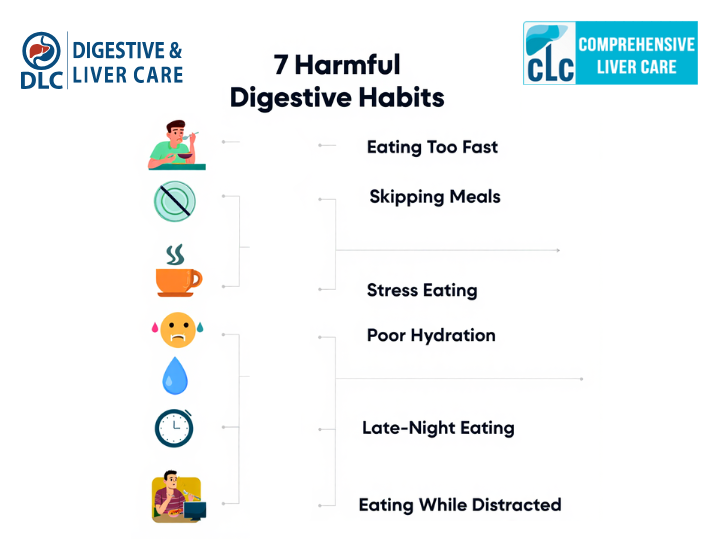How Your Digestive System Responds to Poor Nutrition
- livercarecenter23
- May 10, 2025
- 3 min read
The phrase “you are what you eat” holds a deeper truth than most realize. What you feed your body directly shapes the way your digestive system functions. Poor nutritional habits can silently disrupt the complex processes involved in digestion, leading to discomfort, nutrient deficiencies, and chronic health conditions. In this article, we explore how poor nutrition affects your gut, with insights rooted in modern gastroenterology.
1. The Digestive System: A Nutrient-Driven Engine
Your digestive system is a finely tuned network of organs, enzymes, and microbes that work together to break down food, absorb nutrients, and eliminate waste. Every bite of food triggers a response:
The stomach releases acid to begin digestion.
The small intestine extracts essential nutrients.
The large intestine processes what remains and supports gut microbiota
When your diet lacks nutritional balance, these processes become inefficient, affecting the entire body.
2. Key Nutritional Imbalances and Their Digestive Consequences
Low Fiber Intake
A diet low in fiber, common with processed and fast foods, slows down bowel movements and alters gut bacteria.
Effects:
Constipation
Bloating
Increased risk of diverticulitis and colorectal conditions
High Sugar and Saturated Fat
High intake of refined sugars and saturated fats contributes to gut inflammation and microbial imbalance (dysbiosis).
Effects:
Gas, cramping, and irregular stools
Increased risk of leaky gut syndrome
Aggravation of conditions like IBS and Crohn’s disease
Lack of Essential Nutrients
Missing key vitamins and minerals (like B12, iron, and magnesium) affect both digestion and energy production.
Effects:
Poor absorption in the small intestine
Fatigue and digestive discomfort
Altered motility (delayed or rapid emptying)
3. The Gut Microbiome's Reaction to Poor Diet
One of the most sensitive aspects of digestion is your gut microbiome—the trillions of bacteria living in your intestines. This microbial ecosystem plays a vital role in:
Breaking down complex carbs
Synthesizing vitamins (like B12 and K)
Regulating immune and metabolic functions
When a poor diet starves beneficial bacteria and feeds harmful ones, the microbiome becomes unbalanced. This imbalance is linked to:
Chronic inflammation
Digestive disorders
Mental health issues via the gut-brain axis
Gastroenterology experts often emphasize the importance of gut health when treating patients with recurring digestive complaints.
4. Impact on Gastrointestinal Disorders
Long-term poor nutrition doesn’t just cause temporary discomfort—it increases your risk for serious GI disorders, including:
Gastroesophageal Reflux Disease (GERD): Triggered by high-fat, low-fiber diets
Irritable Bowel Syndrome (IBS): Aggravated by artificial additives and processed foods
Inflammatory Bowel Disease (IBD): Linked to dietary triggers and microbial imbalances
Liver and pancreatic issues: Often a result of excessive alcohol and processed sugars
If symptoms like bloating, acid reflux, abdominal pain, or irregular stools are frequent, it’s crucial to consult a gastroenterologist for an accurate diagnosis and dietary guidance.
5. Signs Your Digestive System Is Under Stress
Poor nutrition may not cause instant effects, but subtle signs build up over time. Watch for:
Persistent bloating or gas
Changes in bowel habits
Feeling sluggish after meals
Food intolerances develop gradually.
Unexplained nutrient deficiencies (iron, B12, calcium)
These symptoms are signals that your digestive system is overworked and possibly undernourished.
6. Gastroenterology’s Role in Nutritional Health
Gastroenterology isn’t just about treating severe GI conditions—it’s about understanding how nutrition affects every level of digestive health. Many gastroenterology clinics today offer:
Nutritional assessments
Gut microbiome testing
Personalized dietary plans for IBS, IBD, GERD, and more
Monitoring of vitamin and mineral absorption
By collaborating with specialists in the field, patients gain deeper insight into how food choices impact their gut and long-term health.
7. Rebuilding Digestive Wellness Through Better Nutrition
Improving your digestive health starts with intentional dietary changes:
Increase fiber intake: Add vegetables, fruits, legumes, and whole grains.
Prioritize hydration: Water aids digestion and keeps things moving.
Limit processed food and added sugars: Support gut flora and reduce inflammation.
Include fermented foods: Yogurt, kefir, kimchi, and sauerkraut support microbiome balance.
Eat mindfully: Chew thoroughly and avoid overeating, especially before bed
Simple changes can lead to significant improvements in digestion, energy levels, and overall well-being.
Conclusion: Your Gut Reflects Your Nutrition
The digestive system is remarkably resilient, but it’s not immune to the effects of poor nutrition. From microbial imbalance to chronic GI conditions, what you eat matters more than ever. By understanding how the gut responds to diet and seeking guidance from gastroenterology professionals, you can restore digestive balance and support long-term health from the inside out.



Comments